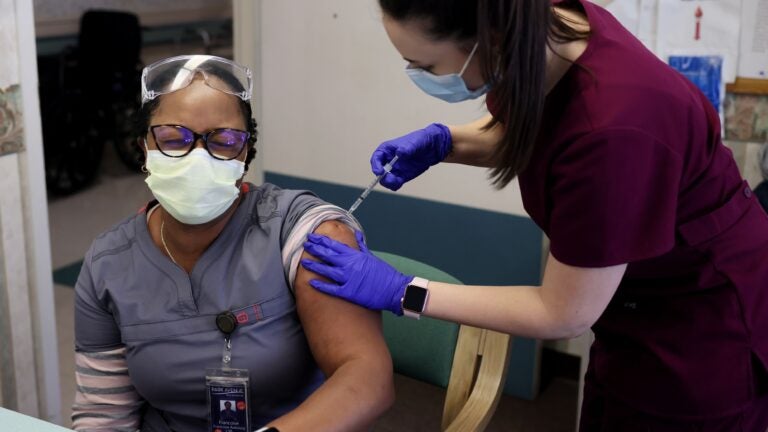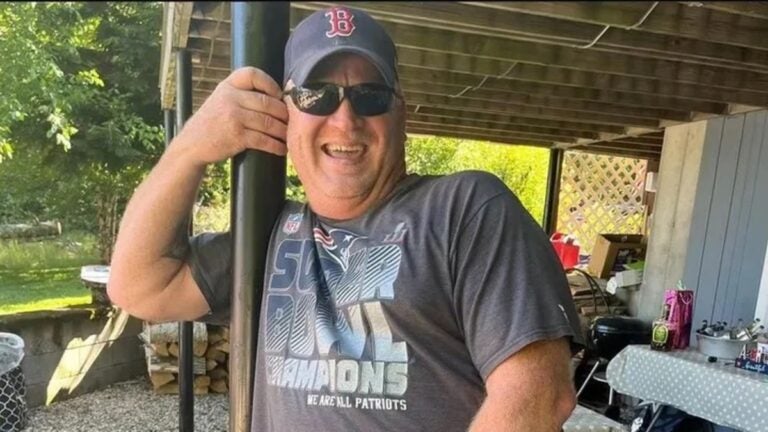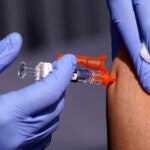Proposed COVID and flu vaccination rules for health workers allow many exceptions

All health workers in Massachusetts would be required to receive COVID-19 and flu vaccinations under proposed new state rules, even as federal regulators abandon similar COVID vaccination requirements. But the new proposal allows so many exemptions — including for medical, religious, and personal reasons — that some health care leaders are pushing back.
The Massachusetts Health & Hospital Association, in a recent letter to the state Health Department, warned that such latitude could lead to uncertainty about how to implement and enforce the rules as well as to “unnecessary and costly litigation.”
Already, some of the state’s largest hospital systems — Mass General Brigham and Beth Israel Lahey — are fending off lawsuits from workers fired for refusing COVID shots earlier in the pandemic. The workers say their requests for religious or medical exemptions were denied without a reasonable process for discussion or appeal. The hospitals have denied those assertions.
The hospital association said the proposed new rules, allowing workers to decline shots for “any reason,” could also undermine the high flu vaccination rates — some as high as 98 percent of their workforce — in hospitals with more strict mandates.
“Vaccination rates of health care personnel could significantly decrease, increasing infection risk for patients and staff,” the association’s letter stated.
It suggested the state revamp its proposal to explicitly give hospitals more discretion on exemptions.
But state Health Commissioner Dr. Robbie Goldstein, in an interview with the Globe, said that hospital systems are “more than welcome” to go above and beyond state standards and that many health care facilities already do that for flu shots.
“Many of the largest health care systems require or mandate influenza vaccine, and don’t allow for any refusal, even though our [current] regulations would allow them to permit a refusal for vaccination,” he said.
Current state rules do not require most health care workers to be vaccinated against COVID, but mandate it for those working in hospice and nursing homes. Those workers are allowed medical and religious exemptions.
In the interim, hospitals have enacted their own COVID rules, and they vary greatly. UMass Memorial Health, the largest health system in Central Massachusetts, does not require COVID shots. In a statement, spokesperson Debora Spano said that the health system is following the new federal rules, which do not require the shots, but that UMass “strongly encourages our caregivers to get the vaccines.”
Mass General Brigham requires its workers to get the primary series — their initial COVID shots — while Dana Farber Cancer Institute mandates the initial shots plus at least one booster. Tufts Medical Center requires its workers be “fully vaccinated,” and defines that as the primary series plus a booster.
But several hospitals said they were awaiting new state rules to determine how their own rules may change.
The health care industry, from hospitals and nursing homes to doctors’ practices, is still struggling with severe staffing shortages in the wake of the pandemic, when many workers burned out or retired. Some hospital systems reported terminating hundreds of workers in late 2021 and early 2022 for refusing COVID shots.
The Massachusetts Nurses Association sees the proposed rules as a path back for a number of its members who were terminated for not getting vaccinated. The association, which has arbitrations pending at multiple hospitals challenging those terminations, said it supports vaccinations but only if employers “provide a fair process” allowing for religious and medical exemptions.
“We think these new regulations provide a more balanced approach and hope it will lead to amnesty and the rehiring of those who were fired for not being vaccinated,” it said in a statement.
The state’s nursing home industry, which was especially hard hit by COVID as well as staffing shortages, said it welcomes the proposed rules. It said 20 percent of caregiving positions are still vacant in nursing facilities, forcing over one-third of facilities to limit or deny new admissions, and described a “dire need” to immediately hire 6,100 people to stabilize the industry.
“Nursing facilities have had to compete with other health care settings where staff were not required by regulation to be up-to-date on vaccinations,” the association said in a letter to state regulators. “The proposed amendments to the regulations for both long-term care facilities and other health care settings will go a long way toward ‘leveling the playing field’ in regard to enabling facilities to recruit new staff to the long-term care sector.”
While just 45 percent of current nursing home staff in Massachusetts are up to date with COVID vaccinations, federal data show, that is substantially better than the 25 percent nationwide.
“It’s good that state regulators are still encouraging vaccination. It will protect residents’ lives, but this [proposed] policy leaves some pretty big loopholes that you can drive a truck through,” said David Grabowski,professor of health care policy at Harvard Medical School.
He said allowing such wide latitude for exemptions could drive down vaccination rates.
“Deaths are way down and things look a lot better given vaccinations and treatments like Paxlovid, but all of this can go in the wrong direction,” he said.
The latest state data for flu vaccinations among health care workers shows what can happen when leaders allow a lot of exemptions. Among the state’s hospitals, where flu shots are generally mandated with limited exceptions, 91 percent of workers received the vaccines this past winter. But in nursing homes, where enforcement was not as stringent, just 62 percent of workers got vaccinated. That figure was even lower for dialysis centers, where just 53 percent were vaccinated.
The state’s Public Health Council, an appointed board of physicians, academics, and consumer advocates that helps the Health Department set policy, is slated to vote on the proposed rules Sept. 13. Goldstein, the state’s health commissioner, said regulators are reviewing the concerns they have received and will consider them before finalizing the rules for late September.
“People are most protected when they’re up to date with their vaccines,” Goldstein said.
“This process that we’re going through elevates the standard in many ways, and says that we would like health care facilities to ask their workers, who are in very vulnerable settings and working with very vulnerable populations, to have the best level of protection possible,” he said. “And that is being up to date with their vaccine.”








Conversation
This discussion has ended. Please join elsewhere on Boston.com